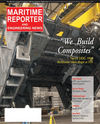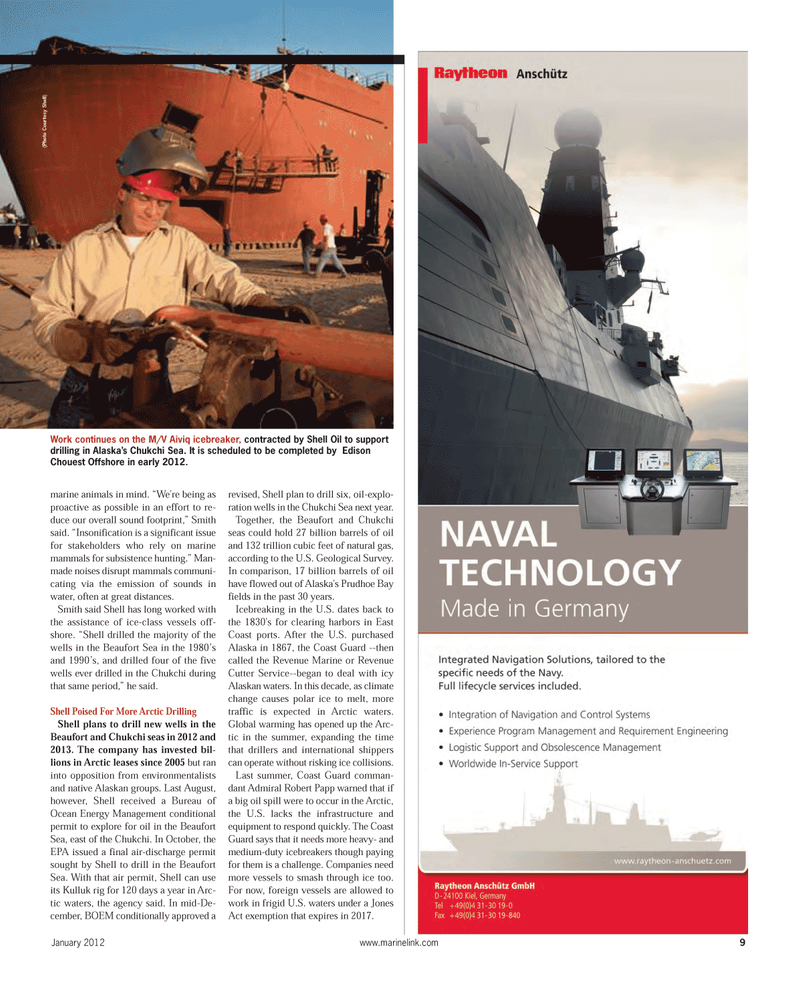
Page 9: of Maritime Reporter Magazine (January 2012)
US Navy Report
Read this page in Pdf, Flash or Html5 edition of January 2012 Maritime Reporter Magazine
January 2012www.marinelink.com 9marine animals in mind. ?We're being as proactive as possible in an effort to re- duce our overall sound footprint,? Smith said. ?Insonification is a significant issue for stakeholders who rely on marine mammals for subsistence hunting.? Man- made noises disrupt mammals communi-cating via the emission of sounds inwater, often at great distances. Smith said Shell has long worked with the assistance of ice-class vessels off- shore. ?Shell drilled the majority of thewells in the Beaufort Sea in the 1980?s and 1990?s, and drilled four of the five wells ever drilled in the Chukchi during that same period,? he said. Shell Poised For More Arctic Drilling Shell plans to drill new wells in theBeaufort and Chukchi seas in 2012 and 2013. The company has invested bil- lions in Arctic leases since 2005 but ran into opposition from environmentalists and native Alaskan groups. Last August, however, Shell received a Bureau of Ocean Energy Management conditional permit to explore for oil in the Beaufort Sea, east of the Chukchi. In October, the EPA issued a final air-discharge permit sought by Shell to drill in the BeaufortSea. With that air permit, Shell can use its Kulluk rig for 120 days a year in Arc- tic waters, the agency said. In mid-De- cember, BOEM conditionally approved a revised, Shell plan to drill six, oil-explo- ration wells in the Chukchi Sea next year. Together, the Beaufort and Chukchi seas could hold 27 billion barrels of oiland 132 trillion cubic feet of natural gas, according to the U.S. Geological Survey. In comparison, 17 billion barrels of oilhave flowed out of Alaska's Prudhoe Bay fields in the past 30 years. Icebreaking in the U.S. dates back tothe 1830's for clearing harbors in EastCoast ports. After the U.S. purchased Alaska in 1867, the Coast Guard --thencalled the Revenue Marine or Revenue Cutter Service--began to deal with icy Alaskan waters. In this decade, as climate change causes polar ice to melt, moretraffic is expected in Arctic waters. Global warming has opened up the Arc- tic in the summer, expanding the time that drillers and international shipperscan operate without risking ice collisions.Last summer, Coast Guard comman- dant Admiral Robert Papp warned that if a big oil spill were to occur in the Arctic, the U.S. lacks the infrastructure andequipment to respond quickly. The Coast Guard says that it needs more heavy- and medium-duty icebreakers though paying for them is a challenge. Companies needmore vessels to smash through ice too. For now, foreign vessels are allowed to work in frigid U.S. waters under a Jones Act exemption that expires in 2017. (Photo Courtesy Shell) Work continues on the M/V Aiviq icebreaker, contracted by Shell Oil to support drilling in Alaska?s Chukchi Sea. It is scheduled to be completed by Edison Chouest Offshore in early 2012. MR Jan.12 # 1 (1-9):MR Template 1/9/2012 11:35 AM Page 9

 8
8

 10
10
